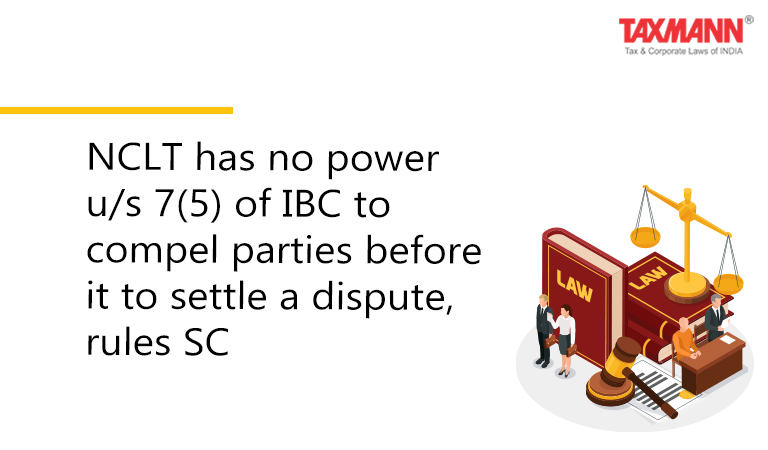NCLT has no power u/s 7(5) of IBC to compel parties before it to settle a dispute, rules SC
- Blog|News|Insolvency and Bankruptcy Code|
- 2 Min Read
- By Taxmann
- |
- Last Updated on 16 December, 2021

Case Details: E S Krishnamurthy v. Bharath Hi-Tech Builders (P.) Ltd. - [2021] 133 taxmann.com 159 (SC)
Judiciary and Counsel Details
-
- Dr. Dhananjaya Y. Chandrachud and A. S. Bopanna, JJ.
Facts of the Case
In the instant case, the NCLT declined to admit a petition filed under Section 7 of the IBC for initiating the Corporate Insolvency Resolution Process and instead directed the Corporate Debtor to settle the claims within three months. The NCLAT upheld the order. The issue which arose for adjudication before the Supreme Court was whether, in terms of the provisions of the IBC, the NCLT can without applying its mind to the merits of the petition under Section 7, simply dismiss the petition on the basis that the corporate debtor has initiated the process of settlement with the financial creditors?
Supreme Court Held
The Supreme Court observed that the Adjudicating Authority is empowered only to verify whether a default has occurred or if a default has not occurred. Based upon its decision, the Adjudicating Authority must then either admit or reject an application respectively. These are the only two courses of action which are open to the Adjudicating Authority in accordance with Section 7(5).
The Supreme Court ruled that the Adjudicating Authority cannot compel a party to the proceedings before it to settle a dispute. Undoubtedly, settlements have to be encouraged because the ultimate purpose of the IBC is to facilitate the continuance and rehabilitation of a corporate debtor, as distinct from allowing it to go into liquidation.
” As the Statement of Objects and Reasons accompanying the introduction of the Bill indicates, the objective of the IBC is to facilitate insolvency resolution “in a time-bound manner” for maximisation of the value of assets, promotion of entrepreneurship, ensuring the availability of credit and balancing the interest of all stakeholders.
What the Adjudicating Authority and Appellate Authority, however, have proceeded to do in the present case is to abdicate their jurisdiction to decide a petition under Section 7 by directing the respondent to settle the remaining claims within three months and leaving it open to the original petitioners, who are aggrieved by the settlement process, to move fresh proceedings in accordance with the law. Such a course of action is not contemplated by the IBC.
The IBC is a complete code in itself. The Adjudicating Authority and the Appellate Authority are creatures of the statute. Their jurisdiction is statutorily conferred. The statute which confers jurisdiction also structures channelises and circumscribes the ambit of such jurisdiction. Thus, while the Adjudicating Authority and Appellate Authority can encourage settlements, they cannot direct them by acting as courts of equity. ” Court said.
Disclaimer: The content/information published on the website is only for general information of the user and shall not be construed as legal advice. While the Taxmann has exercised reasonable efforts to ensure the veracity of information/content published, Taxmann shall be under no liability in any manner whatsoever for incorrect information, if any.

Taxmann Publications has a dedicated in-house Research & Editorial Team. This team consists of a team of Chartered Accountants, Company Secretaries, and Lawyers. This team works under the guidance and supervision of editor-in-chief Mr Rakesh Bhargava.
The Research and Editorial Team is responsible for developing reliable and accurate content for the readers. The team follows the six-sigma approach to achieve the benchmark of zero error in its publications and research platforms. The team ensures that the following publication guidelines are thoroughly followed while developing the content:
- The statutory material is obtained only from the authorized and reliable sources
- All the latest developments in the judicial and legislative fields are covered
- Prepare the analytical write-ups on current, controversial, and important issues to help the readers to understand the concept and its implications
- Every content published by Taxmann is complete, accurate and lucid
- All evidence-based statements are supported with proper reference to Section, Circular No., Notification No. or citations
- The golden rules of grammar, style and consistency are thoroughly followed
- Font and size that’s easy to read and remain consistent across all imprint and digital publications are applied



 CA | CS | CMA
CA | CS | CMA
